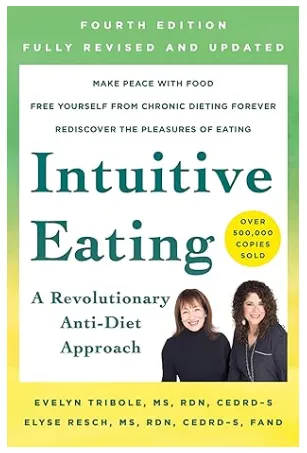Intuitive Eating
Craig Shearer - 5th August 2024
Recently I was listening to the Inner Cosmos podcast, which explores the human brain from a neuroscience perspective. One of the episodes was about intuition, and the host was interviewing an Australian scientist, Joel Pearson, about intuition. During the interview, the scientist mentioned Intuitive Eating. This was a new term for me, so I thought I’d look it up and see what it was all about.
During the interview, Pearson seemed quite negative about the concept, but I thought it was worth exploring to understand the details, and figure out whether it’s science or pseudoscience, or a mixture of both.
It probably goes without saying that the whole area of human nutrition is a minefield full of pseudoscience and dubious ideas. Visit a bookshop and you’ll see shelves stocked with a vast array of diet books promoting various ways of eating, in the hope of achieving whatever culture tells us is the ideal body shape. The web is rife with various theories of eating, often with quite extraordinary claims of success.
And that’s not surprising, since it’s such a fertile ground for money-making opportunities by “influencers” and gurus. Most popular diets generally aren’t sustainable, as many focus on cutting out specific foods, or severely restricting calorie intake. So they don’t produce the desired results, long term. But there’s always a steady supply of people willing to fork out money for the latest guaranteed-results-fast fad!
Investigating Intuitive Eating brought me to its website home - intuitiveeating.org. It surprised me to discover that this is a concept that has been around since the mid 1990s - and I’m surprised that I’d not heard of it before. It was invented by two California-based women - Evelyn Tribole, a dietician, and Elyse Resch, a nutrition therapist.

The inventors seem to have formed a community around their ideas, and you can pay for a consultant to help to get on the bandwagon, or buy one of their books to help you follow the plan.
The core concepts around intuitive eating are their 10 principles, which are based around the idea of essentially letting your body decide when and what to eat.
Reject diet culture - “Throw out the diet books” - which seems like a good idea, though ironically Intuitive Eating, as I mentioned above, has its own books, as well as counsellors and community. Broadly, though, they’re calling out the principle of fad diets - that the latest and greatest diet is going to miraculously help you lose weight if you scrupulously follow its plan.

It looks a lot like a diet book to me!
Honour your hunger - this seems to be the core of Intuitive Eating. The concept, which is hardly rocket science, is that you should “keep your body fed with adequate energy and carbohydrates.” It’s interesting that they separate carbs from energy, but their reasoning seems to be that by cutting out carbs (a very popular thing to do), you’re depriving your body of things that it needs, which can trigger an unconscious drive to eat.
Make peace with food - this covers the concept of “forbidden” foods. Foods that are forbidden likely lead to feelings of deprivation, which can then result in bingeing and resulting guilt.
Discover the satisfaction factor - basically, humans derive pleasure from eating. Honouring that pleasure and satisfaction from the eating experience will help make you feel full and content.
Feel your fullness - this is about listening to your body’s signals about when it is full and when to stop eating.
Challenge the food police - however rational we like to think we are, many of us harbour beliefs around food that aren’t based in reality, or are misleading.
Cope with your emotions with kindness - this is based around the idea of eating when you’re not hungry, and based on emotions. Many people use food as a means of comfort or distraction. When you’re tired or bored, or dealing with stress, it’s easy to try to deal with those things by eating. I find, especially with extreme tiredness, that it’s easy to fall into eating badly in an attempt to appease the tiredness.
Respect your body - here they are saying that we should accept our genetic blueprint. It seems fairly clear that humans come in a variety of sizes, and that our genes play a fairly large role in how our bodies process food and how our bodies are shaped. As always, though, there’s a combination of genetics and environment at play. The way you feed your body will overlay the genetic effect, to some extent.
Movement - feel the difference - this is about exercise, and shifting the focus from the point of exercise to be the number of calories burned, to that of moving your body for the effect that it has. Bodies need to be moved about regularly, and there are many benefits from exercise beyond calorie burning.
Honour your health - gentle nutrition - this is about making food choices that prioritise well-being, your taste buds and culture. They make the point that you “don’t have to eat perfectly to be healthy”. They make the claim that eating and exercise only account for 10 percent of your health - though I wonder how that would be measured.
From reviewing that list of principles, I think that they mostly make sense. I think there’s a large dose of common sense that can be applied to eating, and we should reject the various dubious and unhelpful notions that arise in fad diets.
There is some culture and community around Intuitive Eating that makes it feel like another “diet”, though, and I wonder how it’s different from just “not being on a diet”, or being on another “different” diet. But, I guess that’s a little cynical. They do list quite an array of studies specifically around intuitive eating, which actually beats most fad diets that have little to no evidential support.
The approach of Intuitive Eating does seem to be sound, and a variety of other organisations, such as the NZ Heart Foundation, have endorsed it.
But, as with most things, there are things about it that could be problematic. I found this page from a dietitian, Michelle Yates, who promotes and uses Intuitive Eating, but outlines some of the issues with it:
Over corrections about food morality - Intuitive Eating tends to promote the idea that food has moral value, and that there’s virtue in “clean eating”. We see concepts such as orthorexia, where people obsessively check what they’re eating, and will refuse to eat certain “bad” foods. Nevertheless, this doesn’t mean you can ignore all advice about foods. The nutritional value of food ingredients is still important.
Cherry-picked and misleading data - she identifies several claims that aren’t necessarily backed up by evidence or are misleading:
- 95% of diets fail - it depends on the context. It’s certainly possible to make major lifestyle changes and see substantial health benefits. She quotes a randomised controlled trial on over 5,000 overweight or obese people with Type 2 Diabetes over an 8 year period. The group who were on the comprehensive weight-loss counselling maintained a mean weight loss of nearly 5% of their body weight, compared to those on a more traditional support programme. So clearly, diets aren’t universally unsuccessful.
- Starvation mode - that if you restrict calories your body goes into starvation mode and once you stop restricting you will tend to gain the weight back and then more because you’ve damaged your metabolism, therefore restrictive diets are useless. She cites a systematic review of 33 studies showing that this is largely a myth.
- Obesity doesn’t negatively affect health - she states that Intuitive Eating is strongly connected with the Health At Every Size movement, which basically claims that there are no health implications with being overweight or obese. The popular conception of obesity is that it’s extremely dangerous, and you’ll keel over from it at any minute. The truth is somewhere in between. Having obesity certainly has negative consequences for your health, such as being a cause of stroke and heart disease, but these are long-term effects, and it’s certainly possible for a person who is physically fit to be overweight. To balance this though, it’s almost never helpful to shame somebody for their weight.
Feelings over facts - it seems that the Intuitive Eating crowd can certainly ignore facts, and prioritise their feelings about things. I think this is probably the main danger. If you’re eating manufactured foods, these are often engineered and tuned for maximum tastefulness at the expense of nutrition. Think added sugar/salt/fat. Ignoring these facts is likely to lead to undesirable outcomes.
Coaches - finally, she points out that Intuitive Eating has a system of coaches that are all over Instagram and TikTok, and that you can become an Intuitive Eating Lay Facilitator (in that you don’t have to be an allied health professional) in just 6 weeks through the official website - for around $1500 USD. And, as we’ve seen in the MLM industry, coaches or consultants will often just regurgitate the information provided by the Intuitive Eating website and books, without knowing how to interpret the data correctly. Obviously, there’s a reason people train to be dietitians or registered nutritionists, and it takes more than 6 weeks!
Looking around the web for NZ-based Intuitive Eating coaches, it seems that there are plenty of nutrition companies with websites promoting Intuitive Eating. As an aside, it seems that there’s a proper professional registration of nutritionists in New Zealand, with some requirements to have appropriate training, which is good to see.
Anyway, overall, I think the approach of Intuitive Eating has some good ideas, particularly since it discourages a diet mentality.
It is interesting to think that there’s still much to discover about our bodies and how they work, that our brains are in the driver’s seat, but they often have little control over how things work out.
I’d like to propose my own skeptical lifestyle programme, which I think makes sense.
- Eat a variety of foods, and especially include foods which you particularly enjoy.
- Don’t cut out any particular food group. Generally, there’s no such thing as a good or bad food, though some foods are more nutritious than others, but that shouldn’t be the sole criteria for choosing a food.
- Be aware that calories matter - that an excess of calorie consumption over expenditure - in the long term - will lead to weight gain.
- Find an exercise that you enjoy. Your body will reward you for moving it. Exercise relieves stress, improves strength and your lungs and heart and circulation, and it has cognitive benefits too. But, realise that exercise will never overcome a poor diet. (As they say “You can’t outrun your fork”)
- Be aware of factors in eating, such as tiredness or stress.
- Be happy in the skin you’re in, but if you want to make changes, that’s OK too.
- Respect others’ choices and bodies, and recognise that their bodies are none of your business.
- Recognise that having the ability to make good food choices is a privilege that many people can’t actually afford
I’ll have a new diet book out soon! 🙂
